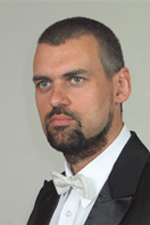> [Archived] Interviews

The 'Lizst - 200' Festival in Cluj-Napoca
We have found out more information about the main events in the programme from an interview with Mr. Horváth József, the artistic director of the Festival.
On October 6th, you will open a grand Festival in Cluj-Napoca. Which are the events that the audience should not miss?
The first symphony concert will feature Missa solennis, a work that hasn't been played entirely in its original form neither in Cluj, nor elsewhere in Romania. Besides the Orchestra of the Hungarian Opera, the Radio Choir in Budapest will also attend the event. We close the Festival on October 27th with a vocal-symphonic concert, which includes the participation of the Academic Radio Choir in Bucharest and during which we will perform - also for the first time in its entirety in Romania - The Legend of Saint Elisabeth, a great calibre oratorio, for the performance of which the Radio Choir in Bucharest was kind enough to learn this vast work in German. There will be approximately 12 other concerts between these two grand ones: piano concerts, organ concerts, chamber music concerts, and also a contest for young pianists. We will also reproduce - together with young pianists - those concerts that Liszt gave in our country in 1846. The programme of the Festival also features an old music concert, in which the Jánosi Ensemble from Budapest will search for those folkloric sources from which Liszt took his inspiration when he composed the Hungarian Rhapsodies. We believe we will present to the audience almost all the creative sides of Frank Liszt, all the types of compositions that he has left to us.
The Festival will also include the day when we celebrate the bicentennial of the birth of Franz Liszt - October 22nd. How will you mark this day?
We have prepared an international symposium of musicology, which features - beside scholars from Cluj and Budapest - researchers from Bucharest and Iași, cities where Liszt performed in 1846. We will also unveil a plaque on the building of the Ethnographic Museum, where Liszt gave three concerts in 1846 and one in 1879 - as far as we know. The plaque displays a sentence written in three languages: "The great composer and pianist Franz Liszt performed in this building."
Translated by Oana Badea
MTTLC, University of Bucharest














